Ukrainian women break gender norms, taking on dangerous jobs during the fight against Russia
From CNN's Nic Robertson, AnneClaire Stapleton, and David Von Blohn
As their country fights to repel Russia’s forces, Ukrainian women are taking on roles and responsibilities previously unavailable to them, often in challenging and dangerous circumstances.
Thousands of Ukrainian men left their jobs to join the military and defend the country after Russia invaded almost 16 months ago. In their absence, Ukrainian women are stepping up.
Ukrainian law previously forbade women from holding jobs deemed too dangerous: underground mining, forging hot metals and operating heavy machinery, for example.
But when Ukrainian President Volodymyr Zelensky declared martial law after Russia invaded, thereby suspending the country’s existing laws, Ukrainian women went to work.
Women have historically played a crucial role in the workforce during wartime, taking on jobs and responsibilities traditionally held by men – as happened during both World Wars.
Breaking gender norms is challenging, but these women are paving the way for greater equality and, they hope, empowering themselves and future generations.
Ukrainian army commander visits troops on front line near Bakhmut
From CNN's Svitlana Vlasova
Col. Gen. Oleksandr Syrskyi, the commander of the Ukrainian Ground Forces, visited troops on the front line near the embattled eastern city of Bakhmut.
Syrskyi "thanked and honored" the fighters in half a dozen brigades "who are destroying the enemy every day,” he said in a Telegram post Sunday. He did not specify exactly when he made the trip.
The commander said Ukraine remains on the defensive in the city of Bakhmut, but said his troops are making progress on the city's flanks.
“Despite the fact that we now control the outskirts of the city, the importance of its defense remains. In the future, this will provide us with opportunities to enter the city when the operational situation at the front changes,” he added.
Remember: While Russia and the Wagner private military company have declared victory in Bakhmut, Ukraine claims it is holding on to a small area in the western part of the city — and that its progress in areas surrounding the city have left it in a strong position.
Here's what we know about the situation in Bakhmut
Since Wagner chief Yevgeny Prigozhin claimed Saturday that his forces had completely seized the eastern Ukrainian city of Bakhmut, there have been claims and counterclaims from both sides.
While CNN cannot independently verify battlefield accounts, here's what the wartime officials are saying:
- Zelensky's denial: Ukrainian President Volodymyr Zelensky says his soldiers are still in Bakhmut, despite what Prigozhin says. "Bakhmut is not occupied by Russian Federation as of today. There are no two or three interpretations of those words," he said while attending the G7 in Japan on Sunday.
- A small foothold: The commander of Ukraine's army acknowledged the area his fighters still claim within city limits is "insignificant." The territory is located on the city's westernmost edge, according to the country's deputy defense minister.
- Advances on the outskirts: However, the same two officials said Ukraine has made significant progress in the Bakhmut suburbs and other areas immediately outside the city. The commander, Col. Gen. Oleksandr Syrskyi, said his troops have advanced along the city’s flanks and are now approaching the “tactical encirclement” of Bakhmut.
- Putin's congratulations: Russian President Vladimir Putin, meanwhile, hailed Wagner for the "completion of the operation to liberate" Bakhmut. The Ministry of Defense in Moscow echoed the president's praise, declaring victory in the city.
- Bakhmut's significance: Bakhmut is located in the northeastern portion of Ukraine's Donetsk region, about 13 miles from the Luhansk region, and has long been a target for Russian forces. If confirmed, Russia's capture of Bakhmut would mark the country’s first gain in months, but experts say the city’s symbolism always outweighed its strategic importance.
Zelensky tells Japan's prime minister that "now is a crucial moment for the fate of peace in Ukraine"
From CNN's Sarah Dean
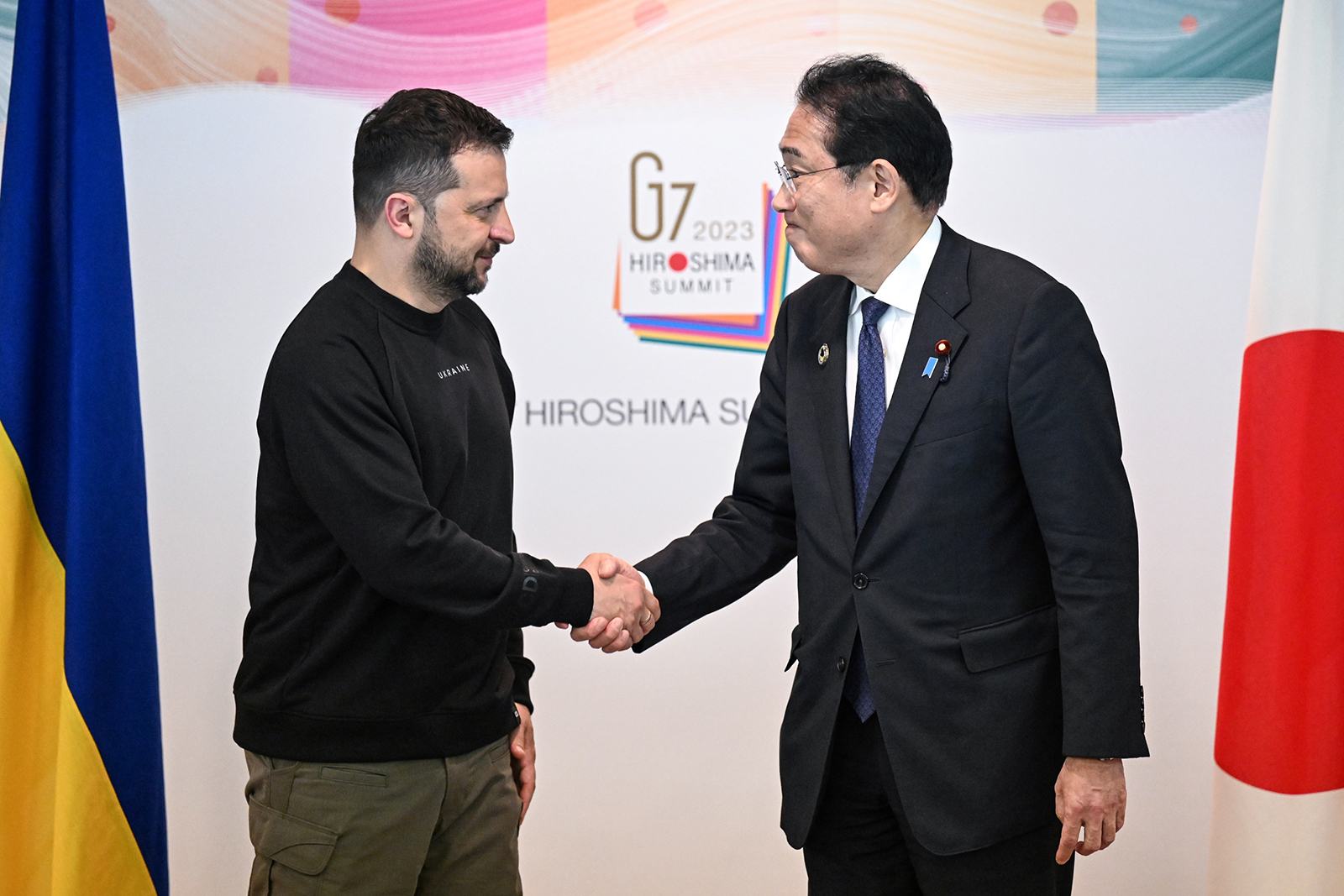
Ukrainian President Volodymyr Zelensky told Japan’s Prime Minister Fumio Kishida that now is a critical moment to secure peace for his country, during a meeting Sunday at the G7 summit.
“Now is a crucial moment for the fate of peace in Ukraine and for the future of the rules-based world order. It is extremely important that the world has the opportunity to hear Ukraine's voice in Hiroshima,” Zelensky said, according to a readout of the meeting.
Zelensky also praised Kishida's leadership in rallying international support for Ukraine and thanked him for the financial assistance the country has provided.
The Ukrainian president also met with US President Joe Biden during the summit in Hiroshima. Biden announced a new aid package for the country Sunday.
Ukraine no longer holds a significant portion of Bakhmut, top general says, but fighters surround the city
From CNN's Maria Kostenko and Allegra Goodwin
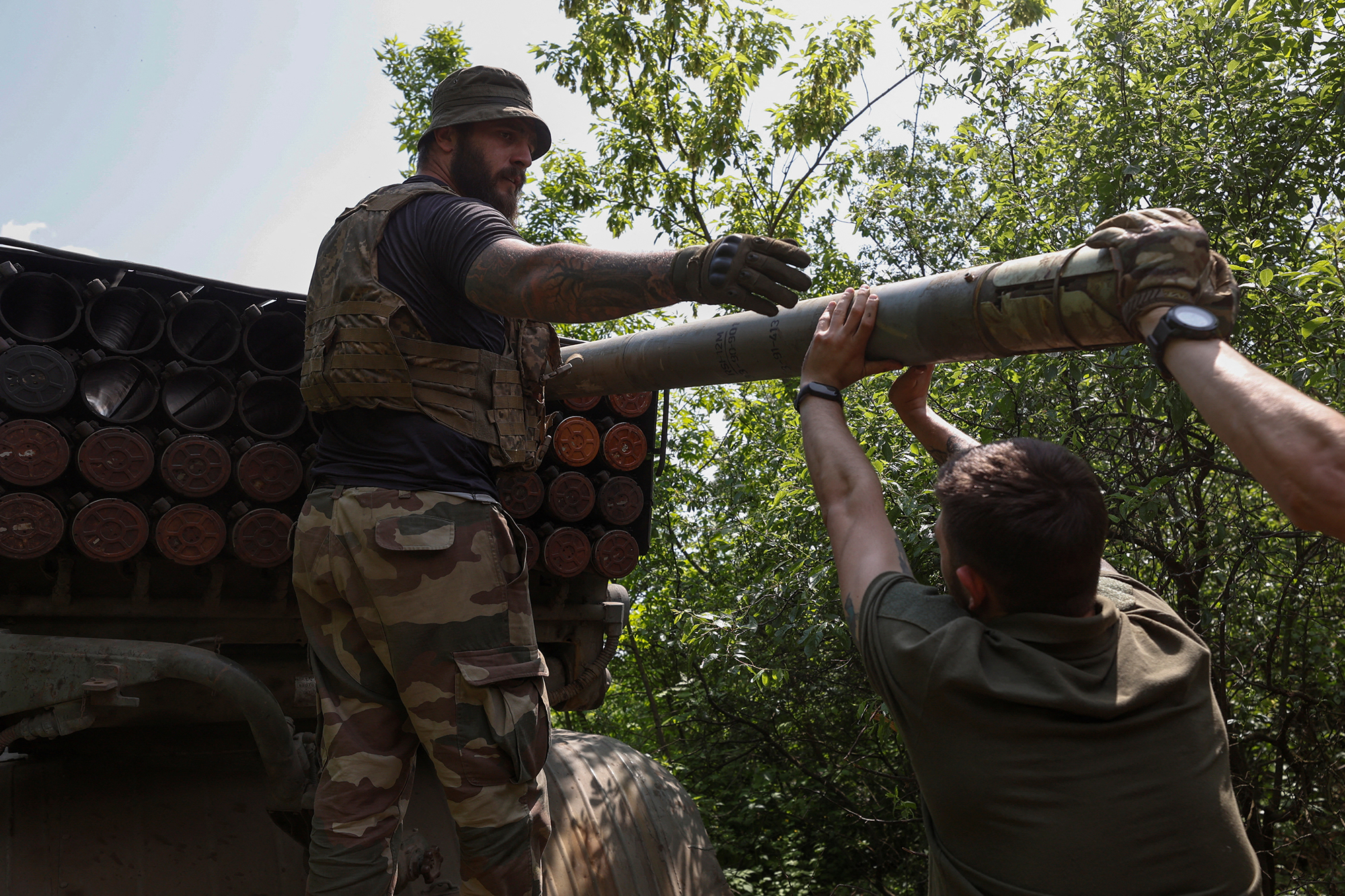
Ukraine's military does not control much of the eastern city of Bakhmut, Ukraine's army commander said Sunday, but its units are holding on to positions surrounding the city.
“Despite the fact that we now control an insignificant part of Bakhmut, the importance of its defense remains. It gives us the opportunity to enter the city in case the situation changes, and this will certainly happen,” Col. Gen. Oleksandr Syrskyi, commander of the Ukrainian Ground Forces, said in a statement shared by Ukraine's military media center.
Syrskyi said his troops have been advancing along the city’s flanks and are now approaching the “tactical encirclement” of Bakhmut. “This will allow us to control all high-rise buildings occupied by the enemy and gradually destroy them,” he said.
“We are continuing our defense. The situation is difficult but under control,” Syrskyi continued.
Some background: The chief of the Russian private military company Wagner, Yevgeny Prigozhin, claimed Saturday that his forces had taken complete control of the city.
Ukrainian President Volodymyr Zelensky and other Kyiv officials have insisted Russia does not entirely occupy Bakhmut, saying Ukraine's military is holding on to a small area on the city's westernmost edge.
CNN cannot independently verify battlefield developments.
In reports from the front leading up to Wagner's claim Saturday, Ukraine's military had focused on progress made in areas immediately surrounding the city, while Wagner forces had said they were consolidating territory closer to the city center.
Zelensky says he would like Japan and South Korea to send lethal weapons
From CNN's Maria Kostenko and Allegra Goodwin
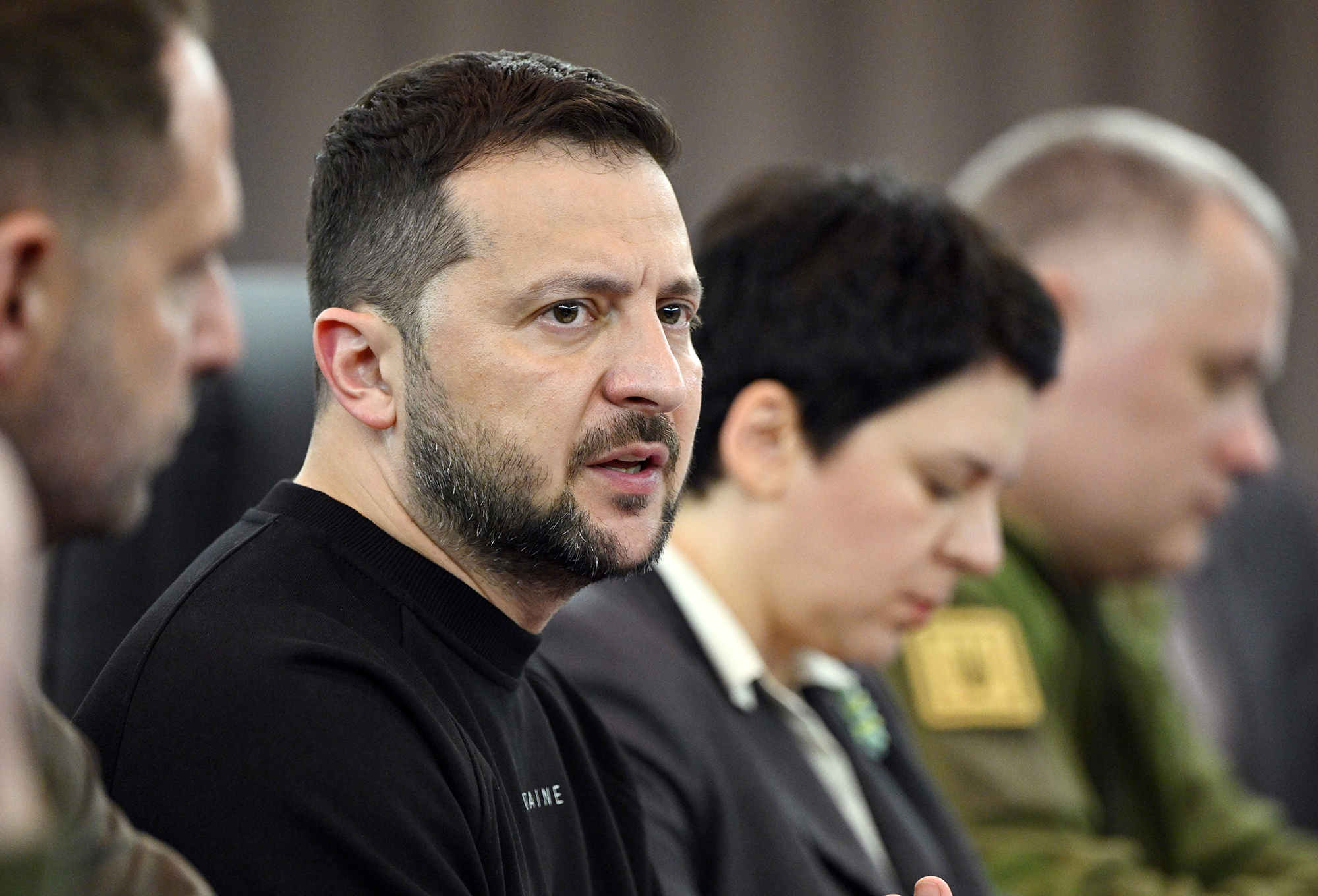
Ukrainian President Volodymyr Zelensky said he would like Japan and South Korea to provide lethal weapons to Ukraine but he understands "there are legislative and constitutional difficulties."
He said regarding diplomatic pressure on Russia and certain formats of diplomatic resolution of the war in Ukraine “the key is respect for the UN Charter and international law."
“Russia has no chance for any diplomatic paths as long as its troops are on our territory in violation of our territorial integrity and sovereignty,” he told a news conference at the G7 summit in Japan.
“We all understand that no one will have anything to do with Russia as long as its troops are on the territory of Ukraine.”
Zelensky made the comments as part of a series of in-person appeals to fellow leaders gathered in Japan to remain united against Russian aggression.
Hiroshima reminds me of Bakhmut, Zelensky tells G7
From CNN's Allegra Goodwin
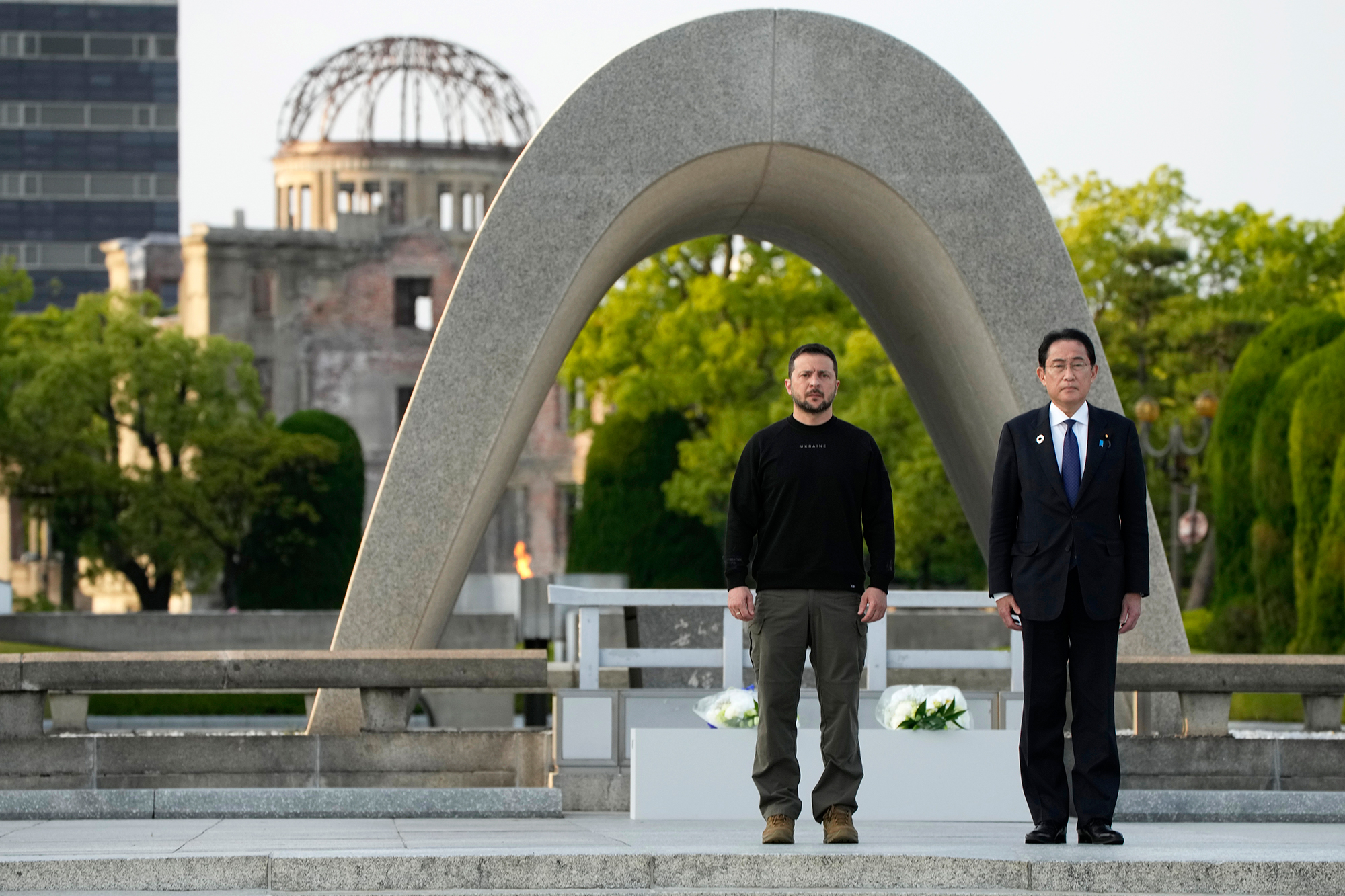
Ukrainian President Volodymyr Zelensky said the pictures of ruined Hiroshima he saw on his visit to the Japanese city “really remind” him of the embattled eastern Ukrainian city of Bakhmut, and other similar settlements or towns.
“Just the same, nothing alive left, all of the buildings have been ruined,” Zelensky said at a news conference.
The city, which Ukraine denies Russia controls, has seen some of the most brutal fighting of the conflict.
"Our soldiers are in Bakhmut," Zelensky says
From CNN's Maria Kostenko, Allegra Goodwin and Sarah Dean
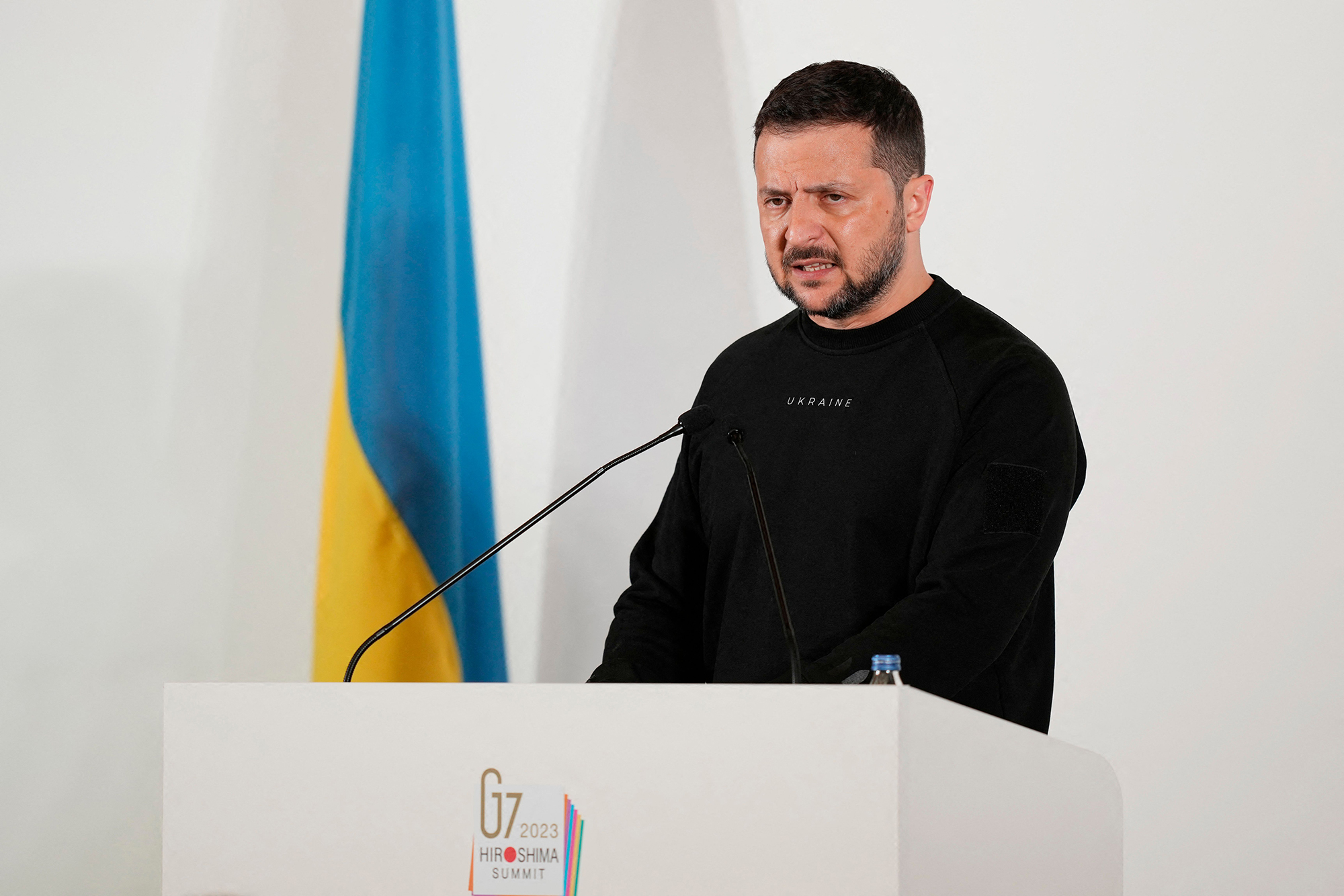
Ukrainian President Volodymyr Zelensky has again denied that Bakhmut is occupied by Russia, saying Ukrainian soldiers remain in the city.
“We are keeping on, we are fighting,” Zelensky said at a news conference at the G7 in Japan.
“I clearly understand what is happening in Bakhmut. I can't share the tactics of the military, but a country even bigger than ours cannot defeat us. A little time will pass and we will be winning. Today our soldiers are in Bakhmut. I will not share the locations,” Zelensky said.
“Bakhmut is not occupied by Russian Federation as of today. There are no two or three interpretations of those words,” he added.
There are conflicting reports about who controls Bakhmut and CNN is unable to independently verify battlefield claims.
Zelensky's comments come after Russia’s Wagner mercenary group on Saturday claimed to have finally taken the Ukrainian city of Bakhmut, the scene of bitter fighting for months.
"We dream of peace after our victory," Zelensky tells G7
From CNN's Allegra Goodwin
Ukrainian President Volodymyr Zelensky said what he has seen in Hiroshima, Japan, is similar to “the ruins of (Ukrainian) cities which have been burned to the ground by Russian bombs and artillery."
Speaking during a news conference at the Group of Seven (G7) summit on Sunday, he said Hiroshima is now a rebuilt city and Ukrainians “dream of rebuilding all our cities that are now in ruins, and every village where not a single house is left intact after Russian strikes."
“We dream of returning our territories, just as we have regained our northern territories which were occupied by Russia. We must regain our eastern and southern territories of Ukraine.
“We dream of returning our people who are now in Russian captivity. These are prisoners of war and civilians, deported adults and also abducted children. We dream of winning, we dream of peace after our victory,” Zelensky said.
Some context: G7 talks culminated Sunday with a series of dramatic, in-person appeals from Zelensky as he pressed leaders gathered in Japan to remain united against Russian aggression.
Zelensky’s decision to travel halfway across the world to deliver his entreaties to the world’s major industrial democracies in person underscored both the unity and the uncertainty leaders find themselves in fourteen months since Russia’s unprovoked invasion of Ukraine began.